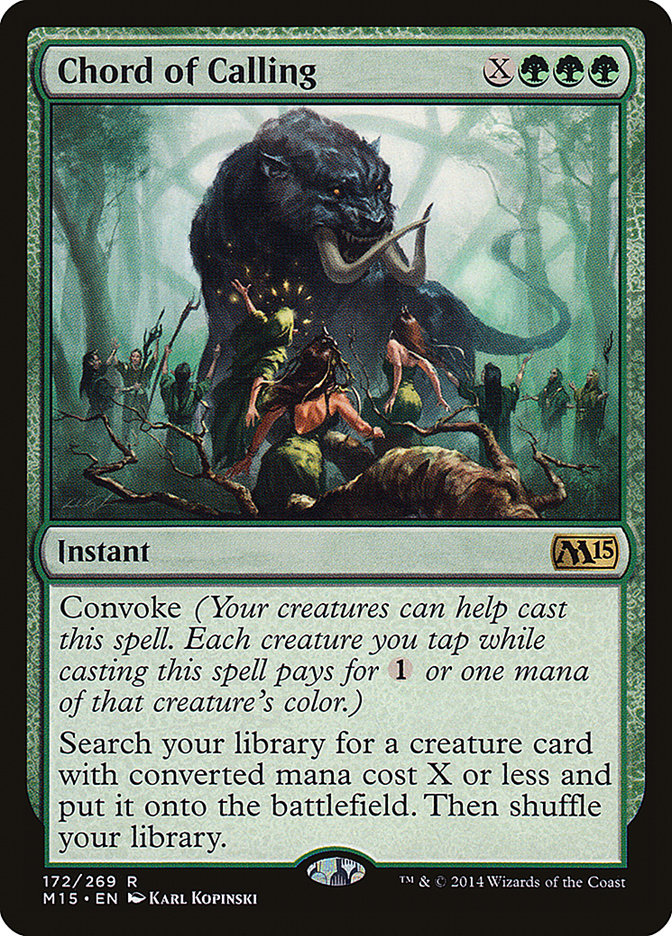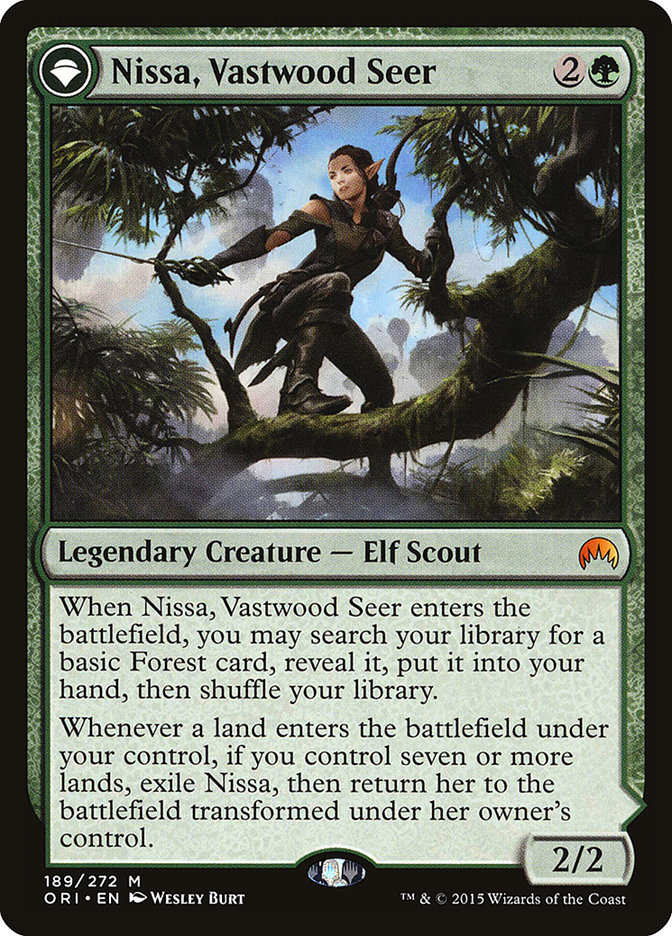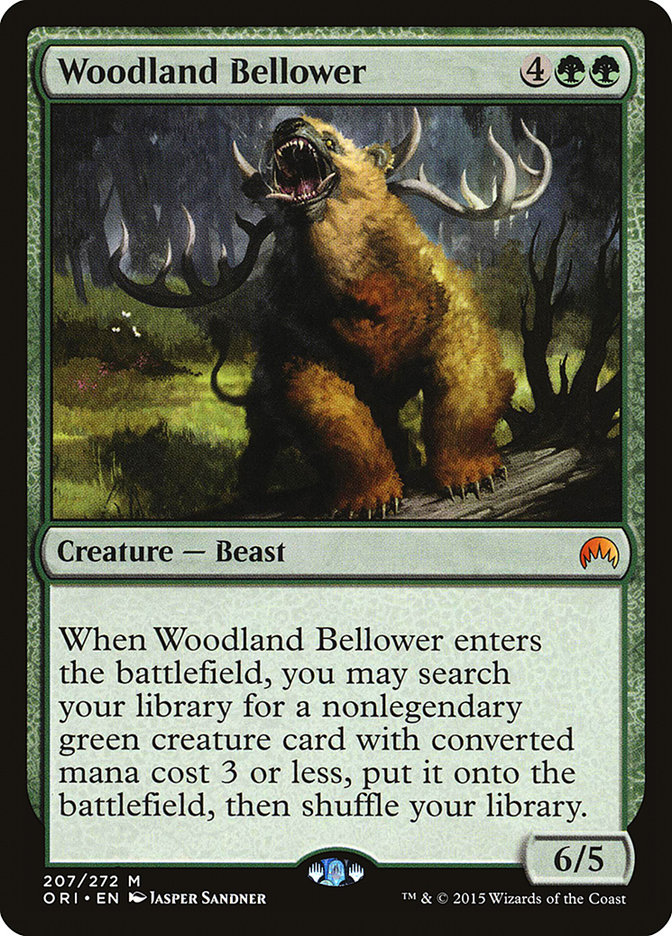I think Chord of Calling, a card I played four copies of at the last Pro Tour and four copies of in my last Standard tournament, is about to get a lot better with Magic Origins.
The nature of Chord of Calling is to get better every time a new set comes out. With each additional expansion it gets more options, which is part of why there was a period when Chord of Calling was played in Modern but not in Standard. However, this set is particularly exceptional for Chord of Calling, so I’d like to go over the highlights.
Lets start at the beginning, with what might be the best card in the set, Nissa, Vastwood Seer. Nissa is huge for Chord of Calling because it plays really well on both ends – creatures that get you a card when they enter the battlefield and then just hang out on the battlefield are perfect for convoke, which is exactly what Nissa, Vastwood Seer is for us early in the game. But later in the game, Nissa becomes a card that is much more powerful than its casting cost implies because it has as an “additional cost” an innate reliance on other elements of the game-state. Specifically, if your opponent has killed all of your creatures and you have exactly six lands, you can only Chord for a three-mana creature, which isn’t a great six-mana effect. However, if you Chord for Nissa, you get your seventh land, play it, and immediately flip Nissa – now you have a planeswalker that’s worth roughly the mana you paid for it, which should be much better than anything you could have previously found with that Chord.
Next up is the other exceptionally-important addition, Woodland Bellower. Having access to a new creature with a unique effect is always a big upgrade for Chord of Calling, but Woodland Bellower is exceptional because it provides redundancy with Chord of Calling itself – once you’ve built your deck to be a toolbox by including cards like Hornet Nest, Reclamation Sage, or maybe even Invasive Species, you can gain twice as much access to your bullets thanks to having twice as many cards that can search for them when you need them. That you can actually Chord for Woodland Bellower is just icing on an already-delicious cake.
Dwynen’s Elite is a card that really helps pull an Elves deck into the Chord of Calling market – getting two creatures to convoke with for only two mana makes it very easy to quickly ramp up to big Chords.
Shaman of the Pack and Sylvan Messenger are the big payoffs for having Chord of Calling in your Elf deck, as you’ll often want to find as many of those as you can once you get going.
I don’t want to get into what every color pair can do with Chord of Calling, but if I’m looking specifically at G/B because I think Chord of Calling Elves might become a major player, then I’d like to comment on a few black creatures in that context.
First, Liliana, Heretical Healer is nice when you can get her at instant speed when another one of your creatures is about to die as she will flip immediately for free.
Next, Gilt-Leaf Winnower is a great bullet, and we’ve seen cards like Shriekmaw and even less powerful cards like Skinrender played in toolbox decks before. It might end up being too expensive, or its restriction might make it too narrow, but I’d definitely start by trying one. There are a lot of good creatures it does kill, and our Chords guarantee that we will have far more creatures than removal spells.
Graveblade Marauder isn’t most at home in an elf deck, but it’s worth calling out as another creature whose effect can scale to become much bigger than its casting cost would imply late in the game. If your opponent casts Languish to kill a huge board of Elves you’ve made later in the game, you might be able to tap six lands, put this onto the battlefield at the end of their turn and attack for lethal.
So what kind of deck am I imagining? Well, Chord of Calling is a versatile card and there are a lot of ways to build with it. So far Hornet Nest, Dragonlord Atarka, and Whisperwood Elemental have all felt like great things to be able to find, so I like it a lot in midrange G/R deck, but I want to look at an alternative.
Creatures (34)
- 4 Sylvan Messenger
- 4 Elvish Visionary
- 4 Elvish Mystic
- 1 Reclamation Sage
- 2 Nissa, Vastwood Seer
- 1 Gilt-Leaf Winnower
- 2 Dwynen, Gilt-Leaf Daen
- 4 Dwynen's Elite
- 4 Gnarlroot Trapper
- 4 Shaman of the Pack
- 4 Thornbow Archer
Lands (21)
Spells (5)

I’m not sure what the split on Sylvan Messenger and Collected Company should be. I currently have four Sylvan Messenger and one Collected Company because I like that Sylvan Messengers can find each other, but it’s possible that Collected Company is just the more-powerful card and that it should be 4-1 the other way with the one Sylvan Messenger just as a Chord of Calling target. It’s also possible that there should be fewer Chord of Callings to make room for more copies of Collected Company.
The sideboard offers the ability to go up to four copies of Reclamation Sage because I think there might be some dedicated enchantment or even artifact decks taking advantage of cards from Magic Origins. Reclamation Sage is still an elf, after all, but when it’s good, it’s very, very good and I want to be able to have the maximum number in my deck.
You’ll note that, as it stand, this deck can’t really deal with opposing creatures… but it’s not trying to. The goal is to come out early and go wide, then win the game with Shaman of the Pack. Everything is about getting to our necessary critical mass in order to make those Shamans good and then finding as many as we can as quickly as possible.
Changing gears, I was a little surprised when this year’s Hall of Fame ballot went out. I looked up when I’d first be eligible at some point in the past, and I remember thinking it was a little weird, but I didn’t remember exactly when it was. Apparently, it was now. I’m on the Hall of Fame ballot for the first time. This is a little surprising because my first Pro Tour was nine years and three months ago, and you’re supposed to need to have played on the Pro Tour for ten years. I guess things get rounded weirdly because of the way seasons work or something. Anyway, I’m actually a little disappointed to be on the ballot this year.
Being elected into the Magic the Gathering Hall of Fame is my single largest goal in life at the moment, and getting there on my first ballot would be great. I was hoping to have one more year to have a great run and build up my numbers. As is, I wouldn’t want to get elected – even if somehow 40% of people voted for me and I got in (which absolutely won’t happen) too many people would think I didn’t deserve to get in. Earning more finishes later would never erase that, I’d just be remembered as a Hall of Famer who shouldn’t be there. Obviously, the system is set up such that I don’t have to worry about that because I won’t be inducted this year, so I’m just a little disappointed that I’m on the ballot because I can’t be a “first-ballot Hall of Famer” which I gather is a thing.
That said, knowing that I won’t get in, I feel like if anyone does vote for me, I can just be deeply honored that they respect and value my contributions enough to give me that consideration even though I wouldn’t vote for myself at this point. (Not that I can.)
As for who I will vote for:
My first sort, as is almost everyone’s, is to break players down by number of Pro Tour Top Eight appearances. I think this sort is given a problematically-high amount of weight since, for example, the difference between a Top Eight and a Top Sixteen is often just a tiny tiebreaker difference, and there’s a pretty huge difference between first place and eighth that this ignores. However, nothing about the Hall of Fame asks us to be diligent about using a metric that perfectly tracks skill or success. Fame is about perception, and Top Eight finishes are high profile. Those eight players are the eight that get their profiles written up in the coverage of the tournament, and they’re the ones who play on camera on Sunday.
I’d like to see a world where the Hall of Fame cared more about community involvement and other things that contribute to actual fame, if that’s the definition we’re using to allow sloppiness with regard to skill, but the international nature of Magic makes it extremely difficult to do that fairly. The fact that players try most to help others in their own region and the language barriers that exist make it very hard to me to have an accurate sense of basically any Japanese player’s community involvement, for example, and heavily weighing the contributions of players I happen to know better leads to biased results. Therefore, we try to lean on numbers as a way of being objective, and then use perception beyond that only as a tiebreaker.
The two players with the most Top Eights are Tomoharu Saito and Scott Johns. Neither one of them have done anything relevant in the last year, and neither one of them was voted for in last year, which is a little telling. Saito is recently off an eighteen-month suspension that reset his Pro status and cost him a Hall of Fame induction after he’d been voted in. I voted for him then, but I’m unlikely to give him another chance anytime soon.
Scott Johns has had the exact same stats every year I’ve been eligible to vote, which has been quite a few at this point. I’ve never met him as a player. I think few people currently voting have. As I see it, he was clearly snubbed by his peers in years before I got a vote, and they’d know better than I. I also believe early PTs were quite a bit easier – all of his success was while tournaments were smaller and the average player was much worse. Again, he’s not someone I ever expect to vote for.
The meat of this ballot then is the five players with four PT Top Eights: Mark Herberholz, Eric Froehlich, Marijn Lybaert, Tsuyoshi Ikeda, and Willy Edel.
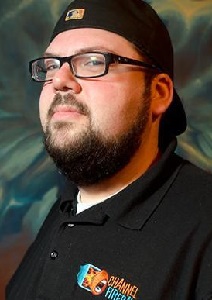 Eric Froehlich has the best results of them by far. He has two more Top Sixteen finishes than any of the others (ten compared to eight, six, four, and four, respectively). His three-year median (which I consider much more relevant than lifetime median because I don’t want to hold it against someone if they got on the PT while they weren’t good or played some events while Magic wasn’t their main focus) is the second-best on the ballot (after Tom Martell); his lifetime median, incidentally, happens to be tied for best on the ballot. He has as many GP Top Eights as the next two players with as many PT Top Eights combined. He’s indisputably the most successful of the players I’d consider voting for.
Eric Froehlich has the best results of them by far. He has two more Top Sixteen finishes than any of the others (ten compared to eight, six, four, and four, respectively). His three-year median (which I consider much more relevant than lifetime median because I don’t want to hold it against someone if they got on the PT while they weren’t good or played some events while Magic wasn’t their main focus) is the second-best on the ballot (after Tom Martell); his lifetime median, incidentally, happens to be tied for best on the ballot. He has as many GP Top Eights as the next two players with as many PT Top Eights combined. He’s indisputably the most successful of the players I’d consider voting for.
Beyond his success, there are other considerations. First, I’ve never heard an accusation of unfair play from him, and I have full confidence in his integrity as a player. In the past, I and other voters have been turned off by how publicly negative he can be at his worst, but he’s made a strong conscious effort to work on that and it really shows. He’s gone out of his way to become a prominent public figure, participating in a variety of streams, podcasts, promotional leagues, and social media. I’ve seen several people seriously consider only voting for him, and he’s this year’s clear slam-dunk candidate.
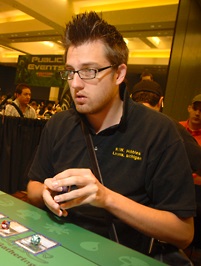 Mark Herberholz is distinguished from the others by his Pro Tour win, which happened to have occurred at my first Pro Tour. He would also suggest that he has also designed several noteworthy decks, and I know that in terms of skill level he’s rated very highly by his peers. To me, his stats are good enough to be right on the cusp – if you want to vote for him, you don’t have to defend yourself, the numbers are good enough, but they’re not so good that they demand a vote. To me, I don’t think he has enough to push him over the edge. Yes, he was great at Magic, but he was never much of a “household name” in Magic and his current involvement with the game is minimal. I think it was Reid Duke who said he looks for players with some unique highlight to their resume to vote for, something they can really be known for, and I believe he listed a Pro Tour win specifically as such a highlight. For me, a single win isn’t exceptional enough by itself. I don’t think I’m going to vote for Mark unless or until he really rejoins the community.
Mark Herberholz is distinguished from the others by his Pro Tour win, which happened to have occurred at my first Pro Tour. He would also suggest that he has also designed several noteworthy decks, and I know that in terms of skill level he’s rated very highly by his peers. To me, his stats are good enough to be right on the cusp – if you want to vote for him, you don’t have to defend yourself, the numbers are good enough, but they’re not so good that they demand a vote. To me, I don’t think he has enough to push him over the edge. Yes, he was great at Magic, but he was never much of a “household name” in Magic and his current involvement with the game is minimal. I think it was Reid Duke who said he looks for players with some unique highlight to their resume to vote for, something they can really be known for, and I believe he listed a Pro Tour win specifically as such a highlight. For me, a single win isn’t exceptional enough by itself. I don’t think I’m going to vote for Mark unless or until he really rejoins the community.
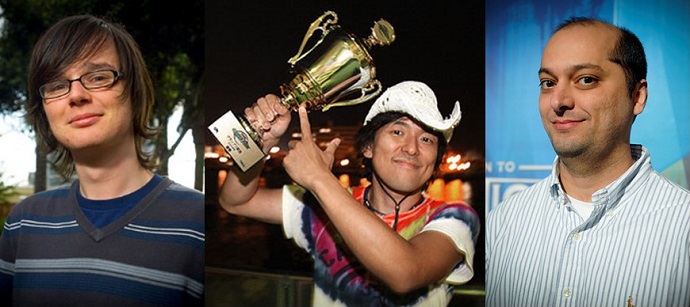
Lybaert, Edel, and Ikeda are players from three different continents, each of whom seem to primarily have support from others on their continent. There’s a much greater language barrier to the Japanese community, so I hear fewer stories about Ikeda than I do about Edel, so I can’t tell if he’s been a similar force for Japan as Edel has been for Brazil. I think it’s possible that he has, I’m just not sure. Anecdotally, I’m reasonably confident that Edel and Ikeda’s contributions to their respective communities outweigh Lybaert’s despite his writing and recent coverage work at European GPs.
Edel and Lybaert have played the exact same number of Pro Tours, which makes comparing their stats fairly easy. Lybaert has done better at PTs by every metric. However, Edel has more than twice as many GP Top Eights and a win. Do those GP results outweigh the PT results? Well, the extra 72 lifetime pro points suggest yes. I think the candidates are very comparable by the numbers. Going further, and comparing them to Herberholz, Lybaert actually has more Top Sixteens and more Top 32s in four fewer events than Herberholz, and a much better three-year median (32 to 59) and only one less GP Top Eight. Unless you give substantial weight to a win (which is reasonable, but I don’t really), their stats are all comparable.
Edel is the best candidate of the three to me because I think he’s a true community leader for essentially his entire continent, which makes him exceptional in a way the others just aren’t.
Ikeda is essentially up for a lifetime achievement award. It’s not that he was ever dominant, but he’s played almost twice as many Pro Tours as Lybaert and Edel (59 to 31). As a result, he beats them on all the counting stats like Top 16/32/64 finishes and lifetime Pro Points. His career is long but not exceptional beyond that, and again, his results can go either way. I wish I understood his role in the Japanese community better than I do. I think he’s a key player, but he’d need to really blow me away at this point to get a vote.
For now, I’m leaning toward voting only for Eric and Willy of the players with four Top Eights. Going beyond that, a few players to highlight who I think are worth considering:
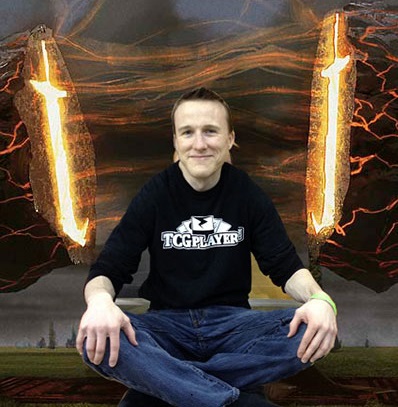 Craig Wescoe: I care about current activity, and he’s the most active of the players with three Pro Tour Top Eights. He also has a win and more GP Top Eights and more pro points than any of the others of this group. He’s a successful deckbuilder and prolific content creator. For me, I can look at his stats and see that his numbers are essentially objectively worse than mine if I win Pro Tour Magic Origins, so I can ask myself if I think I’d deserve to make it in if I won that. The answer is that it’s close. I’m undecided on voting for Craig, but his level of engagement with the community definitely makes me consider him over the players with four Top Eights who I’m not voting for.
Craig Wescoe: I care about current activity, and he’s the most active of the players with three Pro Tour Top Eights. He also has a win and more GP Top Eights and more pro points than any of the others of this group. He’s a successful deckbuilder and prolific content creator. For me, I can look at his stats and see that his numbers are essentially objectively worse than mine if I win Pro Tour Magic Origins, so I can ask myself if I think I’d deserve to make it in if I won that. The answer is that it’s close. I’m undecided on voting for Craig, but his level of engagement with the community definitely makes me consider him over the players with four Top Eights who I’m not voting for.
For many people, three Top Eights is a hard line, but Martin Juza and Shouta Yasooka have 22 and 19 GP Top Eights. Martin has four GP wins and Shouta has one and a PT win as well as a dominant showing at the first new edition of Worlds. Each of them have over 400 lifetime Pro Points, which is a big deal. Shouta has very strong PT stats, he just happens to have only made the Top Eight twice. That matters a lot, but he’s also a Player of the Year and Magic Online Player of the Year and very noteworthy deck designer, almost certainly among the best ever.
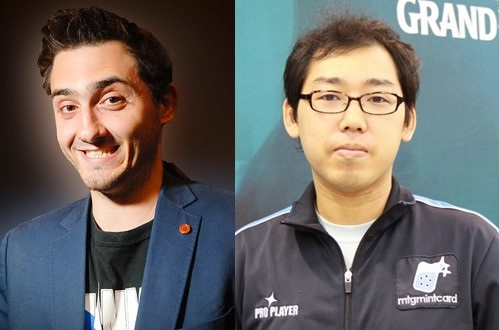
Juza’s dedication to the Grand Prix circuit is exceptional, and I actually don’t think that gets enough respect. Players say it’s the “PT Hall of Fame” and GPs shouldn’t really matter, but GPs are Pro events and they are included in the stats here. I think they’re part of the same system, but I agree, obviously, that each one doesn’t matter very much. Still, there’s something to be said for honoring someone who’s this far ahead of the competition at dominating GPs. Martin is the fourth most successful Grand Prix player in the world behind Olivier Ruel, Shuhei Nakamura, and Yuuya Watanabe.
My ranking as it stands is:
1 Eric Froelich
2 Willy Edel
3 Shouta Yasooka
4 Martin Juza
6 Tsuyoshi Ikeda
That order isn’t locked in stone, and I haven’t figured out how many names I actually want to include on my ballot yet. I’m pretty sure I’ll at least be voting for the first two. I’m most likely to vote for Shouta and Martin as well, but I’m sure I’ll read plenty of other takes before I actually submit my ballot.

